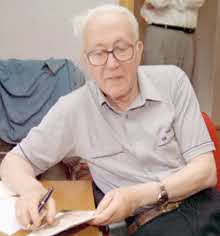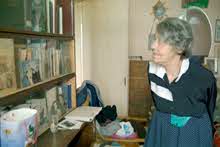Whatever Happened to the Soviet Dissidents?
Where Have All the Soviet Dissidents Gone?
By Reese Erlich for the Russia Project
 Historian Roy Medveyev took some time off at a writer's retreat on the outskirts of Moscow. (Photo by Reese Erlich) |
Tarasov had joined a fledgling Marxist-Leninist opposition group that said the Soviet Union wasn't socialist enough. He and other members were sent to psychiatric hospitals in 1975 on the grounds that anyone who criticized the Soviet government from the Left must be crazy.
"I was told that my views are proof of the fact that I am mentally disabled," said Tarasov in a recent interview. KGB doctors gave Tarasov electroshock ten times and also induced insulin shock. "A person is injected with insulin and then goes into a coma," explains Tarasov. "He is very close to death, and at the right time, he is injected with glucose to save his life."
Such comas were used in the United States and Europe until the early 1950s as treatment for schizophrenia, but the KGB used them as a form of torture against political prisoners.
Without any charges being filed against him, Tarasov was released after one year. He suffered permanent injury to his spine and pancreas, but today lives an otherwise normal life working as a sociologist at a Moscow think tank.
Tarasov was one of thousands of Soviet political and religious dissidents who faced arbitrary arrests, brutal prison conditions, and sometimes torture in the post-Stalin era. Tarasov's case never became well known. Others became world famous: Aleksandr Solzhenitsyn, Andrei Sinyovsky, Yuli Daniel, Natan Sharansky, and Andrei Sakharov, to name a few.
These Soviet dissidents developed a heroic image in the West, promoted by the US government and media. Vladimir Pozner, who now hosts a popular Russian news-interview program, says Western governments wanted people to believe the dissidents were freedom fighters supported by the masses of Soviets.
In fact, says Pozner, "The dissidents represented one tenth of 1 percent of the Soviet people."
If the dissidents had indeed reflected mass sentiment, then one would expect them to be leaders in the new Russia, or at least to exercise political influence. In fact, they don't.
Today virtually none of the former dissidents hold elective office in Russia, and they are largely ignored by politicians and the public alike. The dissidents themselves admit they hold little influence today, and they had little popular support before the Soviet Union's collapse in 1991.
"The Soviet authorities would reproach us that the dissidents weren't representing anyone," former dissident Larisa Bogaraz said in a recent interview. "We wanted the situation to be just like that. Each dissident could represent himself."
Pozner says the dissidents were very brave intellectuals, but most never became organizers with a political program. They could never answer the question "once the Soviet Union disappeared, then what?"
The modern history of Soviet dissidents began on a blustery, overcast winter day in 1965. On December 5, a group of about 20 Soviet intellectuals gathered in Moscow's Pushkin Square. Foreign diplomats and media hovered nearby. So did KGB officers in thick overcoats.
At precisely 6 p.m., the intellectuals began to pull hand-lettered, paper banners from under their coats. Before anyone could even read the banners, the security forces hustled them into waiting black sedans and rushed them to jail.
At the jail a hulking KGB official produced the crumbled banner and, without having read it in advance, thrust it in the face of one of the protesting intellectuals. The banner said, "Please respect the Soviet constitution."
The intellectuals had chosen Constitution Day for their protest and were demanding that the Kremlin adhere to Soviet laws regarding free speech and assembly.
"This KGB official was slightly taken aback," says Ludmila Alexeeva, a prominent dissident who later chaired the Moscow-Helsinki human rights group. "Very soon after that, all the demonstrators were released."
The early political dissidents were almost exclusively academics, professionals, and other intellectuals seeking greater political freedoms within the Soviet system. Some, such as Solzhenitsyn, were die-hard anticommunists. Some were liberal advocates of Western-style political systems; others were Marxists. The Soviet authorities treated them all as enemies of the state.
In 1966 Yuli Daniel and Andrei Sinyavsky were put on trial and convicted for publishing "anti-Soviet" articles in a French magazine. Both were sent to prison camps.
"Yuli had been wounded during the war, and he had a crippled hand," recalls his wife of that time, Larisa Bogaraz, who later became a prominent dissident in her own right. "He was forced to unload rail cars." Medical care and food were bad, she says. "There were no vegetables, no fruits, no vitamins."
In the course of his life, Daniel ended up serving 19 1/2 years in prison. He died in Russia in 1988, and Sinyavsky died in exile in France in 1997.
The dissidents organized informal support committees among fellow intellectuals and received widespread publicity in the West. Some, such as Aleksandr Solzhenitsyn, began to develop anticommunist political programs. But most never saw themselves as a movement that advocated clear political alternatives.
 Larisa Bogaraz in Moscow. She was married to famed political prisoner Yuli Daniel and later became an outspoken Soviet critic in her own right. (Photo by Reese Erlich) |
"I never understood politics," Bogaraz says, sipping strong tea in her Moscow apartment. "My feelings are on the side of liberal values."
Boris Kagarlitsky, who spent 13 months in prison during the Brezhnev years, says the US government sought to influence the dissidents. US embassy officials held clandestine meetings with them, offered support, and broadcast their views on Voice of America and Radio Liberty.
"You become dependent on the people who are friendly to you," says Kagarlitsky. He says physicist Andrei Sakharov "started as [a] democratic socialist. The longer he dealt with their international apparatus, the more he shifted to the right politically, including saying that the Americans did it right bombing Vietnam."
In some cases, the United States strongly supported extreme nationalists, knowing that their views were antidemocratic. Solzhenitsyn, who won a Nobel prize for his novels about Stalinist prison camps, also rejects Western democracy and calls for benevolent authoritarianism based on Russian Christian values.
After a triumphant return and national tour of Russia in 1994, Solshenitsyn's views became more widely known. After initially considering running for elective office, Solzhenitsyn quickly gave up the idea due to lack of support. Today he lives in almost complete political isolation in Moscow.
Some former Soviet dissidents did become political leaders—outside of Russia. Natan Sharansky, a famous human rights activist and Jewish refusenik, is now a right-wing cabinet minister in Israel. Zviad Gamsakhurdia, jailed by the Soviets in the 1970s, became the first president of independent Georgia, but was ousted because of his extreme nationalism and died in 1993 while trying to fight his way back into power.
During the closing years of the Gorbachev era, physicist Andrei Sakharov, historian Roy Medvedev, and a few other dissidents rose to positions of influence. Sakharov was elected to the Congress of People's Deputies and was helping draft a new Soviet Constitution when he died of a heart attack in 1989. Former political prisoner Sergei Kovalyov is now the sole remaining former dissident in the State Duma (lower house), but he has little power.
Shortly after Boris Yeltsin took power in 1991, the former dissidents fell out of favor. The new rulers weren't interested in being criticized for human rights violations. And the dissidents failed to attract mass support because they offered no practical program for solving the massive economic collapse, growth in organized crime, ethnic warfare, and other serious problems afflicting Russia.
During Soviet times "they were dissenting against the authorities from a moral point of view," says Roy Medvedev in an interview. "They never developed a goal to be political leaders. That's why there are few dissidents who are political leaders."
Footsteps echo loudly on the marble stairway at the Andrei Sakharov Center in Moscow, but few people hear them. Set next to a grassy park with large shade trees, the Sakharov museum and archive was established to educate Russians about the repression of the past. On any given day, a few researchers and foreign tourists pass through.
The US Agency for International Development initially funded the Sakharov Center, but when that money was due to run out in December 2000, the center almost closed. Boris Berezovsky, a Russian capitalist linked to widespread corruption in the Yelstin years, donated US$3 million to keep the center open.
The center tries to promote political activism. It brings together former dissidents and intellectuals to protest the Russian war in Chechnya, for example. But few people attend the meetings. And it's not a problem of government repression, admits center director Yuri Samodurov.
"We don't have a feeling we are being watched," he says. "The problem is there is no real public support."
Ironically, human rights violations abound in the new Russia. Rigged elections, large-scale government corruption, poverty, unemployment, and a barely functioning legal system are just some of the violations.
Ludmila Alexeeva, chair of the Moscow-Helsinki human rights group, says human rights violations "are a mass phenomena in all parts of our country. The most painful for society are the vices of our legal system. We would like an independent judiciary."
Former dissident Boris Kagarlitsky now leads a small, social democratic party in Russia.
"Russia is democracy guided through electoral fraud," he says. "We are free to speak, but not to choose. Those who are in power stay in power, no matter what."
Ironically, the former dissidents find themselves in a similar political dilemma as during Soviet times. They don't face long jail sentences, but their protests against human rights violations are ignored by the authorities. The difference this time is that they are also largely ignored by the West.
Home | Transcripts | Contact Us | Credits | Privacy Policy | Terms of Use